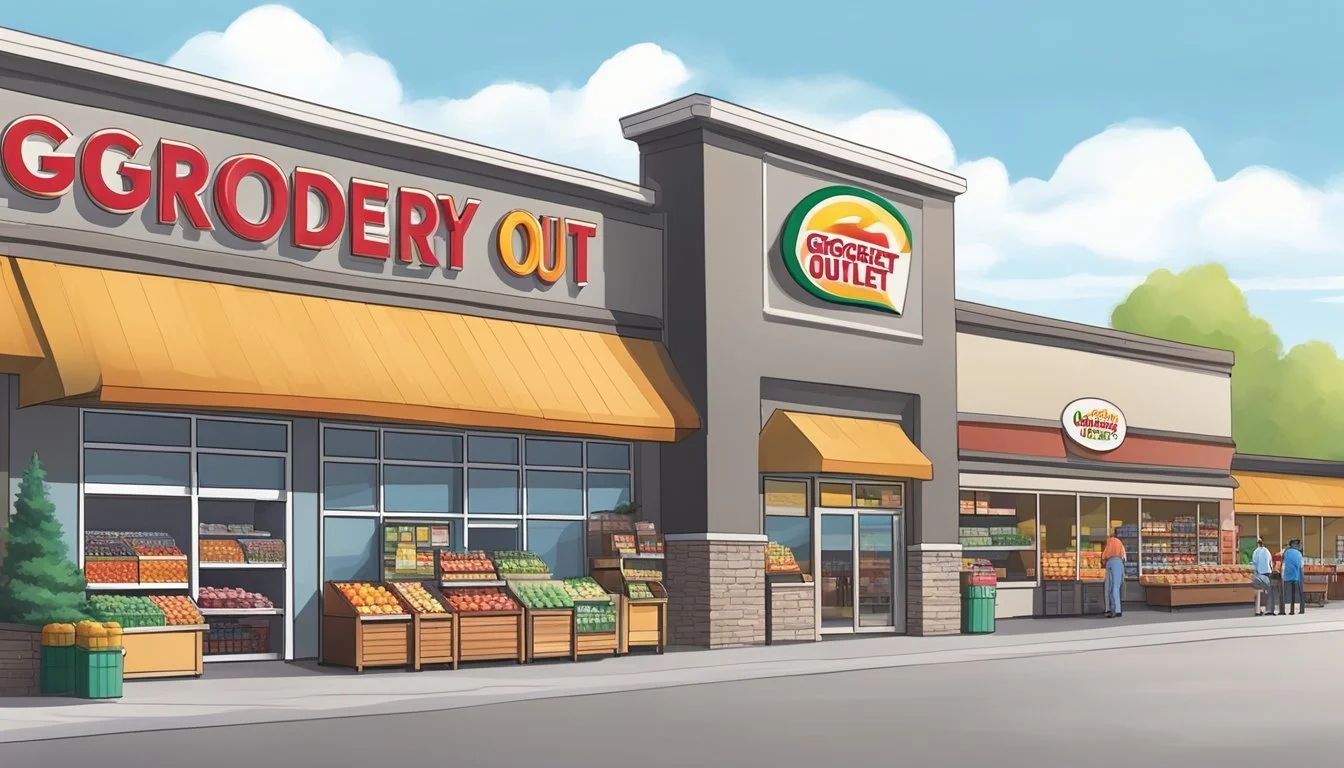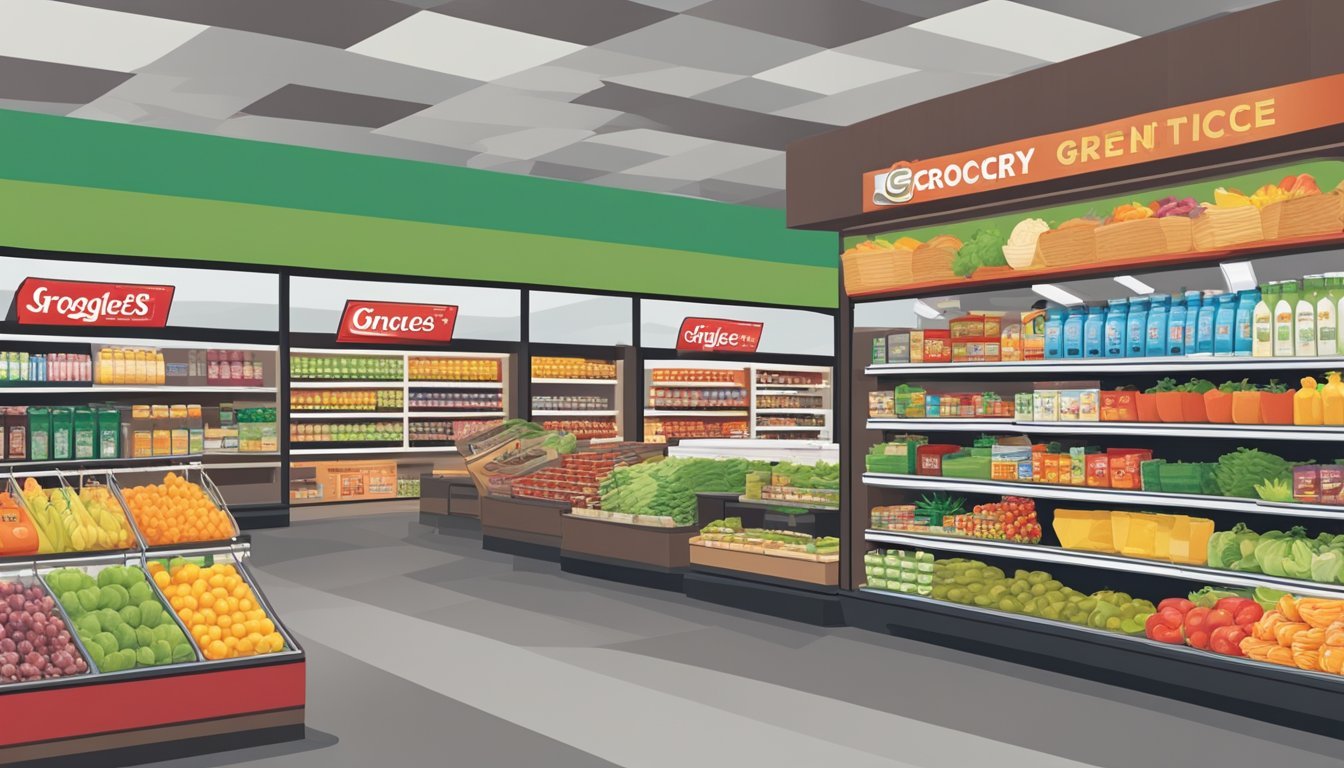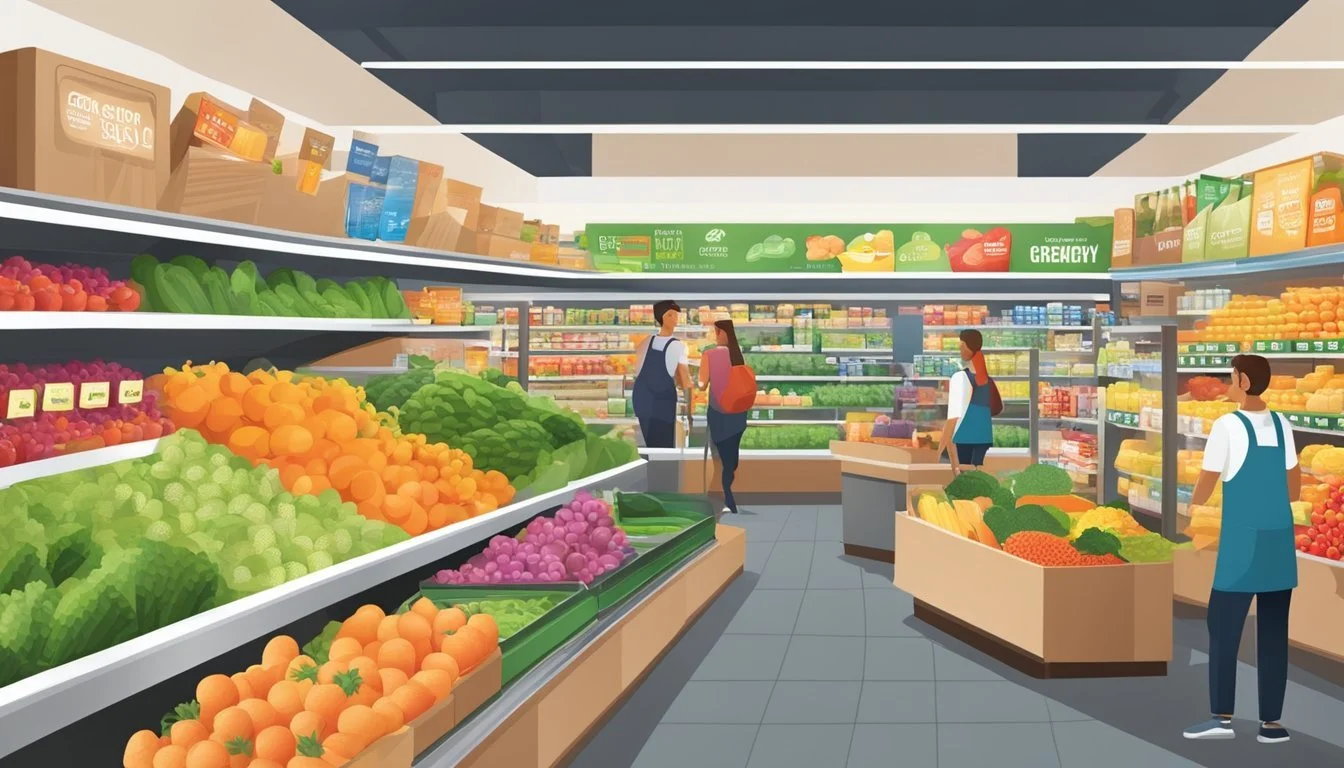Grocery Outlet vs Ingles Markets
A Comprehensive Comparison of Price, Quality, and Selection
Grocery Outlet and Ingles Markets represent two distinct approaches to grocery shopping in the United States. As consumers seek the best value for their money, comparing these stores can provide valuable insights for budget-conscious shoppers.
Grocery Outlet offers deep discounts on brand-name products through opportunistic buying, while Ingles Markets focuses on providing a traditional supermarket experience with competitive pricing. Both chains have carved out their own niches in the grocery landscape, catering to different customer preferences and shopping habits.
Shoppers considering these stores will find differences in product selection, pricing strategies, and overall shopping atmosphere. Understanding these distinctions can help consumers make informed decisions about where to stretch their grocery dollars most effectively.
Company Overview
Grocery Outlet and Ingles Markets are prominent players in the U.S. grocery retail sector. Both companies have unique histories and business models that shape their market positions today.
History of Grocery Outlet
Grocery Outlet traces its roots back to 1946 when Jim Read founded the company in San Francisco. Initially, it operated as a military surplus food outlet.
Over time, Grocery Outlet evolved into a discount grocery chain, specializing in offering brand-name products at significantly reduced prices. The company's business model relies on opportunistic sourcing, purchasing excess inventory from manufacturers and distributors.
Grocery Outlet expanded gradually, focusing on the West Coast before spreading to other regions. The company went public in 2019, marking a significant milestone in its growth trajectory.
Today, Grocery Outlet operates over 400 stores across the United States. It maintains a unique franchise model, with independent operators running individual stores.
Profile of Ingles Markets
Ingles Markets was founded in 1963 by Robert Ingle in Asheville, North Carolina. The company started as a single store operation, focusing on the Southeastern United States.
Ingles Markets has grown into a regional powerhouse, operating over 200 supermarkets across six Southeastern states. The company is known for its large stores, often featuring in-store pharmacies and fuel centers.
Unlike Grocery Outlet, Ingles Markets maintains a traditional supermarket format. It emphasizes fresh produce, high-quality meats, and a wide selection of private label products.
The Ingle family continues to play a significant role in the company's management. Ingles Markets went public in 1987 but maintains a dual-class share structure that ensures family control.
Ingles Markets has built a strong reputation for community involvement and supporting local suppliers in its operating regions.
Store Locations and Accessibility
Grocery Outlet and Ingles Markets have distinct geographical footprints that impact their accessibility for shoppers. Each chain focuses on specific regions, influencing their store count and customer reach.
Grocery Outlet's Geographic Reach
Grocery Outlet operates primarily in the western United States. California hosts the majority of its locations, with 273 stores representing about 56% of the chain's total presence. The company has expanded into other states, including Oregon, Washington, and Idaho.
Grocery Outlet targets urban and suburban areas, often choosing locations in strip malls or standalone buildings. This strategy allows them to serve a mix of densely populated cities and growing communities.
Ingles Markets' Regional Presence
Ingles Markets focuses on the Appalachian region of the southeastern United States. As of September 2021, the company operated 198 supermarkets across this area. Their stores can be found in states such as North Carolina, South Carolina, Georgia, and Tennessee.
Ingles' headquarters is in Black Mountain, North Carolina, reflecting its strong roots in the region. The chain has built a loyal customer base by serving both rural and suburban communities throughout the Appalachian area.
Ingles Markets offers online tools to help customers find nearby stores. Shoppers can enter their zip code or select their city and state to locate the closest Ingles supermarket. This feature enhances accessibility for area consumers seeking convenient shopping options.
Product Range and Quality
Grocery Outlet and Ingles Markets offer distinct product ranges and quality levels. Their selections vary in produce, meats, pantry staples, and specialty items.
Comparing Produce Selection
Grocery Outlet provides a rotating selection of fruits and vegetables at discounted prices. The produce quality can vary, with some items being close to expiration. Ingles Markets offers a more consistent produce department with a wider range of fresh fruits and vegetables. Their produce section often includes locally sourced items, providing customers with seasonal options.
Ingles typically maintains higher quality standards for their produce, ensuring freshness and appealing presentation. Grocery Outlet's produce deals can be hit-or-miss, but savvy shoppers can find significant savings on short-dated items.
Meat and Deli Offerings
Ingles Markets boasts a full-service meat department with trained butchers. They offer a variety of cuts, including premium options and specialty meats. Their deli section provides freshly sliced meats, cheeses, and prepared foods.
Grocery Outlet's meat selection is more limited, focusing on packaged items and frozen options. They occasionally offer deals on higher-end meats, but the selection is inconsistent. Grocery Outlet typically lacks a full-service deli counter.
Dry Goods and Pantry Items
Both stores stock a range of dry goods and pantry staples. Grocery Outlet excels in this category, offering brand-name products at deeply discounted prices. Their inventory changes frequently, creating a "treasure hunt" shopping experience.
Ingles Markets provides a more predictable selection of pantry items. They carry major brands alongside their Laura Lynn private label products. Ingles offers a broader range of options in each category, ensuring customers can find specific items consistently.
Organic and Specialty Foods
Ingles Markets has expanded its organic and specialty food offerings in recent years. They provide a dedicated section for natural and organic products, including fresh produce, dairy, and packaged goods. Ingles also caters to dietary restrictions with gluten-free, vegan, and international food options.
Grocery Outlet's organic and specialty food selection is more limited and varies by location. They occasionally offer organic produce and packaged goods at discounted prices. However, their inventory is less reliable for shoppers seeking specific specialty items or adhering to strict dietary requirements.
Pricing Strategies
Grocery Outlet and Ingles Markets employ distinct pricing approaches to attract and retain customers. Their strategies encompass everyday pricing, discounts, sales, and special offers that impact shoppers' budgets.
Everyday Prices and Discounts
Grocery Outlet focuses on offering significantly discounted products through opportunistic buying and closeout deals. They purchase excess inventory from manufacturers at low costs and pass savings to customers. This allows them to price many items 40-70% below conventional supermarkets.
Ingles Markets takes a different approach. They maintain competitive everyday prices on staple items and household essentials. Their pricing is often lower than large national chains but may be higher than discount stores. Ingles uses a keystone pricing model for many products, setting retail prices at roughly double the wholesale cost.
Both chains offer store brands as lower-priced alternatives to national brands. Ingles' Laura Lynn private label covers a wide range of products. Grocery Outlet carries various closeout and overstocked name brands at deep discounts.
Sale Prices and Special Offers
Ingles runs weekly sales and promotions advertised in circulars and online. They frequently use loss leaders - deeply discounted popular items to draw customers. Common deals include buy-one-get-one free offers and multi-item discounts.
Grocery Outlet's inventory changes rapidly due to its opportunistic buying model. They don't typically run traditional sales but highlight "NOSH" deals (Natural, Organic, Specialty, Healthy) and seasonal bargains. New product arrivals are often priced at significant markdowns.
Both stores offer loyalty programs. Ingles Advantage Card provides personalized coupons and fuel rewards. Grocery Outlet's WOW Rewards gives cashback on purchases. These programs aim to increase customer retention through targeted savings.
Shopping Experience
Grocery Outlet and Ingles Markets offer distinct shopping experiences tailored to different customer preferences. Store layout, convenience, and customer service play key roles in shaping the overall atmosphere at each retailer.
Store Layout and Convenience
Grocery Outlet typically features a no-frills warehouse-style layout. Aisles are often wider to accommodate bulk displays and large pallets. This setup allows for easy browsing of discounted items but may require more time to locate specific products.
Ingles Markets adopts a more traditional supermarket layout. Departments are clearly marked, making it simpler for shoppers to navigate. This organization benefits customers with specific meal plans or shopping lists.
Both stores provide shopping carts and baskets. Grocery Outlet often has fewer checkout lanes, which can lead to longer wait times during peak hours. Ingles usually offers more checkout options, including self-service kiosks.
Customer Service
Grocery Outlet stores are independently owned and operated. This can result in varied customer service experiences between locations. Staff members are generally helpful but may be less numerous than in traditional supermarkets.
Ingles Markets places a stronger emphasis on customer service. Employees are typically more readily available throughout the store to assist shoppers. This can be particularly helpful for families with specific dietary needs or questions about products.
Both retailers train their staff to be knowledgeable about store layouts and current promotions. Ingles often provides additional services like carryout assistance, which can be valuable for customers with large purchases or mobility concerns.
Comparison of Additional Services
Grocery Outlet and Ingles Markets offer distinct additional services to enhance the shopping experience. These include delivery options and loyalty programs designed to provide convenience and savings.
Grocery Delivery Options
Ingles Markets provides grocery delivery through Instacart in select areas. Customers can order online or via the Instacart app for same-day delivery. Fees vary based on order size and delivery time.
Grocery Outlet does not offer a company-wide delivery service. Some individual stores may partner with third-party delivery services, but this is not standard across all locations.
For shoppers who prioritize delivery, Ingles Markets has a clear advantage in this area.
Loyalty Programs and Rewards
Ingles Markets operates the Ingles Advantage Card program. Cardholders receive digital coupons, fuel discounts, and personalized offers based on shopping habits.
Grocery Outlet does not have a centralized loyalty program. Some stores may offer local rewards or punch cards, but these vary by location.
Ingles' structured loyalty program provides consistent savings opportunities for regular shoppers. Grocery Outlet, while known for low prices, lacks a unified rewards system.
Market Position and Competition
Grocery Outlet and Ingles Markets occupy distinct positions in the U.S. grocery retail landscape. They face competition from major national chains as well as regional players, each with unique strategies to attract customers and gain market share.
Grocery Outlet and Ingles Markets vs Other Retailers
Grocery Outlet operates as a discount grocery chain, focusing on offering brand-name products at significantly reduced prices. It competes with other discount retailers like Aldi and Lidl, as well as larger chains such as Walmart.
Ingles Markets positions itself as a regional grocery chain in the southeastern United States. It faces competition from national retailers like Walmart and regional powerhouses like Publix.
Both companies contend with Trader Joe's, known for its unique product offerings and devoted customer base. Walmart poses a significant challenge due to its extensive reach and competitive pricing.
Grocery Outlet's business model of selling overstock and closeout items gives it an edge in pricing. Ingles Markets leverages its regional focus and community ties to maintain customer loyalty.
The grocery sector remains highly competitive, with chains constantly adapting to consumer preferences and economic conditions. Price, convenience, and product selection are key factors in this ongoing competition.
Consumer Insights
Grocery Outlet and Ingles Markets attract distinct shopper bases with varying preferences and behaviors. Understanding these consumers provides valuable insights into each store's strengths and market position.
Shopper Demographics and Behavior
Grocery Outlet appeals to bargain hunters and deal-seekers across income levels. Many shoppers visit multiple times per week to check for new discounted items. Families and budget-conscious individuals make up a significant portion of their customer base.
Ingles Markets tends to attract more rural and suburban shoppers in the southeastern United States. Their stores often serve as community hubs in smaller towns. Ingles shoppers value convenience and a wide selection of both national brands and local products.
Researchers have found that Grocery Outlet customers are more likely to stock up on non-perishables when they find good deals. Ingles shoppers, on the other hand, tend to make more frequent trips for fresh produce and prepared foods.
Brand Perception and Customer Loyalty
Grocery Outlet has cultivated a reputation for offering significant savings on brand-name products. Shoppers view it as a treasure hunt experience, never knowing what deals they might find. This unpredictability keeps customers coming back regularly.
Ingles Markets is perceived as a reliable, full-service grocery store with strong ties to local communities. Their loyalty program and fuel rewards have helped build a stable customer base. Many shoppers appreciate Ingles' focus on fresh, high-quality produce and meats.
The Consumerpedia podcast has highlighted how Grocery Outlet's ever-changing inventory creates a sense of urgency and excitement for shoppers. In contrast, Ingles' consistency and familiar layout provide comfort and ease for regular customers.
Conclusion
Grocery Outlet and Ingles Markets both offer unique shopping experiences for budget-conscious consumers. Grocery Outlet excels in providing deep discounts on a rotating selection of brand-name products. Their ever-changing inventory keeps shoppers on their toes, often leading to unexpected deals.
Ingles Markets, on the other hand, provides a more traditional grocery shopping experience. With over 200 stores across six southeastern states, Ingles offers consistency and a wider range of products. Their operating margins are strong compared to larger competitors.
Price-conscious shoppers may find better deals at Grocery Outlet, especially on packaged goods and household items. However, Ingles Markets likely offers a more comprehensive selection of fresh produce and local products.
Both chains have their strengths. Grocery Outlet appeals to bargain hunters willing to be flexible with their shopping lists. Ingles Markets caters to those seeking a familiar, full-service grocery experience.
The choice between the two ultimately depends on individual preferences and priorities. Shoppers valuing rock-bottom prices and don't mind limited selection may prefer Grocery Outlet. Those prioritizing consistency and a broader product range might lean towards Ingles Markets.







